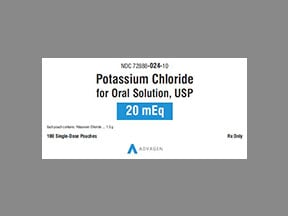
Klor-con Coupons & Savings Card – Discount Prices from $33.09
Brand for: Potassium chloride
My prescription
Edit
20MEQ, Potassium Chloride (30 Packets)
Select pharmacy

CVS
$36.65
COUPON PRICE
Walgreens
$33.09
COUPON PRICE
Albertsons
$36.66
COUPON PRICE
Walmart
$38.79
COUPON PRICEKlor-con savings card
Show this card to your pharmacist
Walgreens
$33.09
BIN
ID
PCN
GRP
019876
LH50568F44
CHIPPO
LHX
Powered by
Related potassium salts prescriptions
More prescriptions for hypokalemia
Related potassium salts prescriptions
More prescriptions for hypokalemia
Price history for Klor-con (brand) & Potassium Chloride (generic)
30 Packets, 20MEQ
Average retail price for Klor-con
Average retail price for Potassium Chloride
Average SaveHealth price for Potassium Chloride
Our price history data is based on aggregated prescription data collected from participating pharmacies in America. Our prescription data updates daily to reflect the latest price changes. If you notice a missing data point, it means there wasn't sufficient data available to generate a monetary value for that date.
Over the last 12 months, the average discount price of Klor-con is $40.45 using the SaveHealth savings card. That's an average savings of 86.08% on Klor-con with our discount card.
*Retail prices are based on pharmacy claims data, and may not be accurate when we don't have enough claims.
Klor-con (Potassium Chloride) dosage forms
Dosage Quantity Price from Per unit 20MEQ 30 Packets $33.09 $1.10 20MEQ 1 Packet $1.01 $1.01 20MEQ 50 Packets $48.88 $0.98 20MEQ 100 Packets $87.19 $0.87
| Dosage | Quantity | Price from | Per unit |
|---|---|---|---|
| 20MEQ | 30 Packets | $33.09 | $1.10 |
| 20MEQ | 1 Packet | $1.01 | $1.01 |
| 20MEQ | 50 Packets | $48.88 | $0.98 |
| 20MEQ | 100 Packets | $87.19 | $0.87 |
What is the drug Klor-con used for?
Klor-Con is used to treat or prevent low levels of potassium in the blood, a condition known as hypokalemia. Potassium is an essential mineral that helps maintain proper function of cells, nerves, and muscles.
Why would a doctor prescribe potassium chloride?
A doctor may prescribe potassium chloride to treat or prevent low levels of potassium in the blood, a condition known as hypokalemia. This can occur due to various reasons, such as prolonged diarrhea, vomiting, use of certain diuretics, or other medical conditions that affect potassium levels. Maintaining adequate potassium levels is important for proper muscle function, nerve function, and heart health.
What are the side effects of Klor con for the elderly?
Klor-Con, a potassium supplement, may cause side effects in the elderly similar to those in the general population, but they may be more pronounced due to age-related factors. Common side effects include nausea, vomiting, diarrhea, and abdominal discomfort. More serious side effects can include hyperkalemia (high potassium levels), which may present as muscle weakness, fatigue, irregular heartbeats, or chest pain. The elderly may also be at increased risk for gastrointestinal irritation or ulceration. It is important for elderly patients to be monitored closely by their healthcare provider while taking Klor-Con.
What should you avoid when taking potassium chloride?
When taking potassium chloride, it is important to avoid using salt substitutes or low-sodium dietary products that contain potassium, as these can lead to an excessive intake of potassium. Additionally, one should avoid taking other medications or supplements that contain potassium unless advised by a healthcare provider. It is also advisable to limit the intake of high-potassium foods, such as bananas, oranges, and potatoes, if instructed by a healthcare professional. Always follow the specific dietary and medication guidelines provided by a healthcare provider.
Why would a doctor prescribe klor con?
A doctor might prescribe Klor-Con to treat or prevent low levels of potassium in the blood, a condition known as hypokalemia. This can occur due to various reasons, such as prolonged illness, certain medications like diuretics, or conditions that cause excessive potassium loss. Maintaining proper potassium levels is important for normal functioning of cells, nerves, and muscles.
